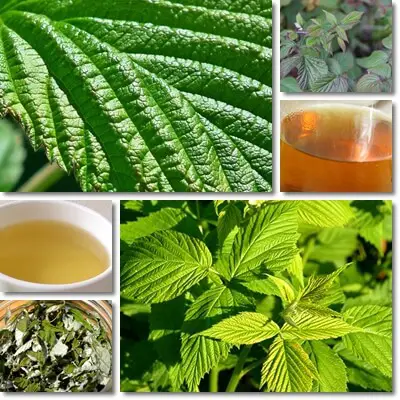Raspberry leaf tea is an excellent therapeutic tea with a number of important benefits for health. Among the most prominent benefits of raspberry leaf are boosting fertility in women of childbearing age and increasing pregnancy chances, regulating hormonal imbalances that cause abnormal bleeding in women, regulating gastric acid production and reducing water retention in legs, arms and associated face puffiness via a diuretic action. Raspberry leaf tea and other raspberry leaf preparations are also used to induce labor. The tea is generally consumed as treatment or prophylaxis to enhance physical health.
What is raspberry leaf tea made of?
As its name so aptly suggests, raspberry leaf tea is made from the dried and finely ground leaf of the raspberry plant. More exactly, the tea is made from red raspberry leaves, also known as the European red raspberry, Rubus idaeus, to distinguish it from the American red raspberry, Rubus strigosus. However, it is important to read the label carefully because any raspberry plant can technically be used to make raspberry leaf tea (fruit and leaves of both cultivated and wild raspberry plants are edible and non-toxic). This includes both European and American red raspberry as well as yellow raspberry, purple raspberry and black raspberry varieties.

What does raspberry leaf tea look like?
Raspberry leaf tea is typically pale amber to orangey brown in color. However, color intensity can vary according to several factors, notably concentration (water to raspberry leaf material ratio) and steeping time (the longer the steeping time, the more color compounds leech into the water and vice versa). Raspberry leaf tea made from fresh or fresher leaves can give the tea a greenish tinge. Raspberry leaf tea that is pink or red is made with additional ingredients, likely red fruits such as rose hips, aronia berries (chokeberries), strawberries, red apples, red raspberries, or rooibos or hibiscus.
What does raspberry leaf tea taste like?
Raspberry leaf tea has a pleasant taste with light bitter flavors on a decidedly herbaceous base. The somewhat earthy undertones support fresh green, grassy notes that build an overall palatable tea with mild taste intensity. Some people find that raspberry leaf tea taste is reminiscent of that of black tea. Raspberry leaf tea is in no way fruity like raspberry fruit tea, but you can always add fresh or dried raspberries to the infusion to supplement the aromatic profile with fruity and tangy secondary flavor notes and enhance color.

What are the benefits of raspberry leaf tea?
Raspberry leaf tea: benefits for abnormal bleeding
Red raspberry leaf tea is commonly consumed for abnormal bleeding in women. It has been proposed that highly biologically active components in red raspberry leaf (e.g. flavonoids) exert beneficial effects on the endocrine system, helping regulate hormonal imbalances that may cause abnormal bleeding in women of childbearing age. More exactly, red raspberry has been found to have estrogenic effects which may explain its benefits for abnormal bleeding in women.
Raspberry leaf tea: benefits for labor
Raspberry leaf tea has been used for natural labor induction for centuries. In folk medicine, raspberry leaf was believed to shorten labor and even make labor easier. In a double-blind, randomized, placebo-controlled trial conducted in a major hospital in Sidney, Australia, 192 low-risk, nulliparous women were given raspberry leaf extract tablets from 32 weeks into the pregnancy and up until labor. Raspberry leaf was found to shorten the second stage of labour and lower rate of forceps deliveries, with no adverse effects for the mother or baby (source).
In a retrospective observational study of 108 participants on raspberry leaf and its effect on labour, it was found that raspberry leaf consumed by pregnant women helped shorten labor with no identified side effects for the women or their babies. An unexpected finding in this study seemed to indicate that women who ingested raspberry leaf might be less likely to receive an artificial rupture of their membranes, or require a caesarean section, forceps or vacuum birth (source).
While the exact mechanism of action is not currently known, it has been hypothesized that bioactive components in raspberry leaf (e.g. flavonoids such as kaempferol, quercetin) stimulate uterine contractions which can augment the effects of oxytocin and stimulate oxytocin-induced contractions (source). However, effects may not be consistent.
Raspberry leaf tea: benefits for menstrual cramps
Raspberry leaf has been called the period vitamin because of its proposed and reported benefits for menstrual periods. In addition to helping control bleeding, raspberry leaf tea and other raspberry leaf preparations provide highly biologically active antioxidants (mainly flavonoids) with anti-inflammatory effects which could potentially hold benefits for painful menstrual cramps.
Raspberry leaf tea benefits for pregnancy
Red raspberry leaf tea is not actually recommended for consumption during pregnancy because of limited safety data regarding side effects such as preterm labor or miscarriage. Nonetheless, raspberry leaf tea holds some benefits for pregnancy in the sense that it can facilitate getting pregnant. Consumption of the tea or other raspberry leaf preparations such as supplements or tinctures is said to increase fertility in both women and men, increasing chances of getting pregnant.
Raspberry leaf tea: postpartum benefits
Red raspberry leaf tea has been reported to provide several benefits postpartum. One of the biggest benefits of red raspberry leaf postpartum is stimulating milk production. Raspberry leaf can also stimulate uterine contractions which can help with lochia elimination which is an integral part of postpartum recovery.
However, some medical professionals do not recommend the use of any herbal remedies postpartum due to limited data on safety (e.g. polyphenols in raspberries are detectable in breastmilk and can be delivered via breastmilk to the baby – source).
Raspberry leaf tea: benefits for diabetes
The antidiabetic benefits of red raspberry leaf tea are owed to biologically active polyphenol antioxidants such as gallic acid, ellagic acid, and procyanidin C3 (source). The antioxidants inhibit α-glucosidase and α-amylase enzyme activity in vitro. It is this inhibitory effect on digestive enzymes that prevents post-meal hyperglycemia in vivo and can potentially prevent oxidative damage or diabetes-related problems.
Raspberry leaf tea: benefits for blood clotting
Research shows raspberry leaf contains biologically active polyphenols with antiplatelet, anti-inflammatory and anticoagulant activity (source) and can contribute with anticoagulant benefits to cardiovascular health. However, if you are on anticlotting medication (e.g. anticoagulants such as warfarin), talk to your doctor first about what is a safe amount of raspberry leaf tea or raspberry leaf supplements for you, if any, and what is the best time to take it (usually some hours after the medication).
Raspberry leaf tea: benefits for high blood pressure
Drinking red raspberry leaf tea can prove beneficial for high blood pressure. Bioactive polyphenols in the tea act at the level of the nervous and cardiovascular systems, inducing relaxation, including blood vessel relaxation, which represents a source of minor benefits for high blood pressure. Red raspberry leaf tea also has diuretic properties which helps remove excess sodium from the body and lower blood pressure numbers.
Raspberry leaf tea: diuretic benefits
Red raspberry leaf tea is a diuretic which means it stimulates the production of urine, increasing the elimination of water from the body. By eliminating excess water, the tea helps reduce water retention in the legs and arms, and associated face puffiness. Moreover, red raspberry leaf tea supports kidney health via the same diuretic action.
Raspberry leaf tea: benefits for digestion
Drinking red raspberry leaf tea on an empty stomach can help regulate production of gastric acid and protect the stomach mucosa. The tea can potentially help with gastritis and gastric ulcers. Regular consumption can also help regulate transit time for more regular bowel movements.
